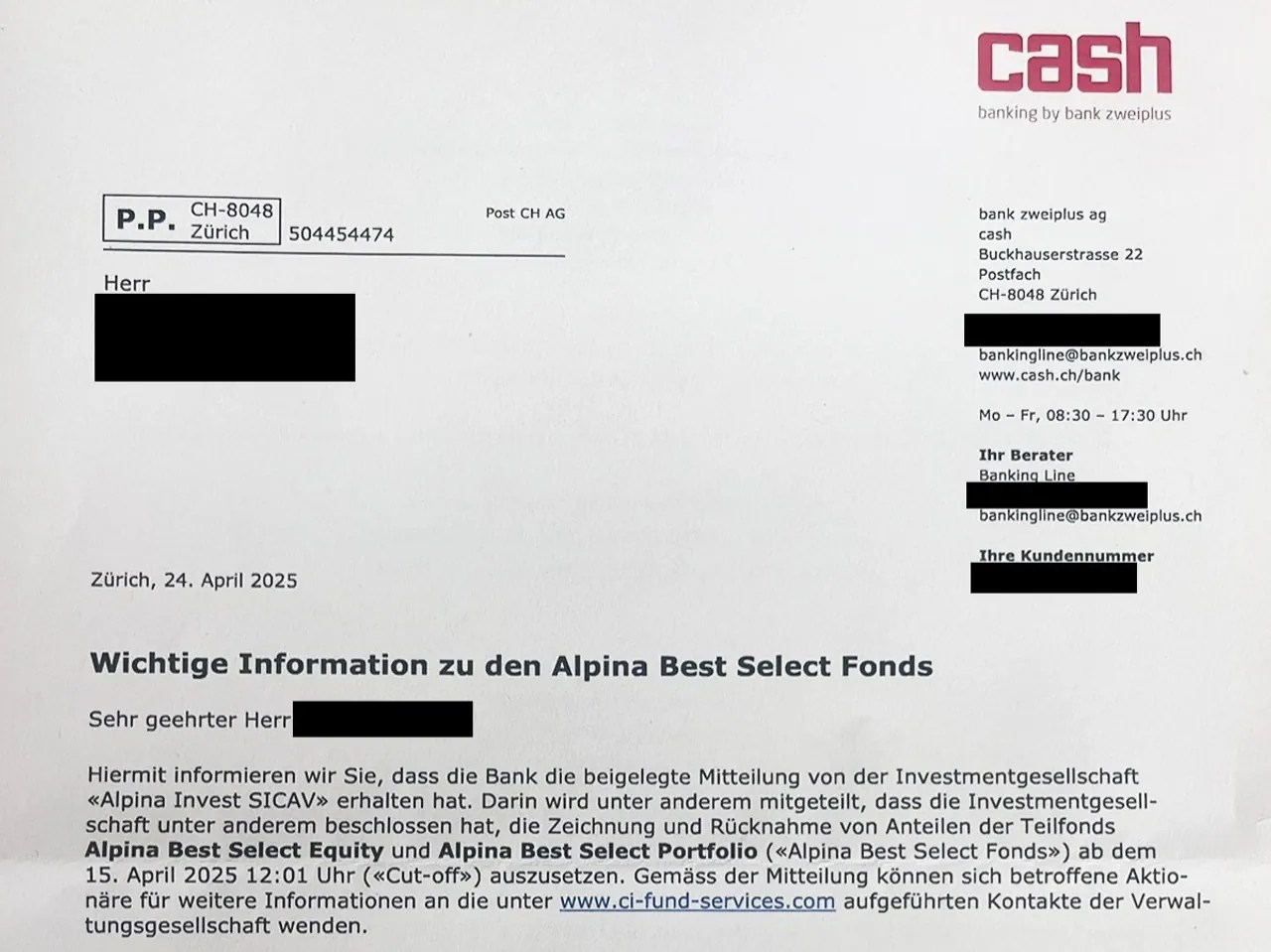
Investment funds in trouble – Swiss customers left out in the cold

Investment funds are popular in Switzerland – around CHF1.6 trillion ($2 trillion) is invested in them, even by people with modest amounts to spare. But what happens when something goes wrong? One example shows that customers can quickly find themselves abandoned.
Markus contacted Swiss public television, SRF, with a problem. For 20 years, since the birth of his children, he and his wife had been investing in a fund. They had built up CHF70,000. Now he wanted to withdraw some of the money to finance his children’s studies. Then came the shock: his bank, Cash – banking by bank zweiplus, informed him that part of the money was blocked. There was a problem with the valuation.
He was told not to worry, as it only affected 16% of his assets. But that only made him more concerned. Trading in the fund units has been suspended for more than five months. Hundreds, possibly thousands, of customers are affected – but no exact figures are available.
In a letter sent in April, Cash – banking by bank zweiplus informed clients that two funds were affected. Trading had been suspended, and customers were told to contact the company managing the funds in Luxembourg, Ci Fund Services. The funds in question are Alpina Best Select Equity and Alpina Best Select Portfolio.

Suddenly, no one is responsible
SRF contacted Ci Fund Services. The CEO referred questions to the board of directors, which in turn handed the matter to a Zurich-based communications agency.
“Cash – banking by bank zweiplus” is a joint venture between the Ringier media company and Bank Zweiplus, which belongs to Sarasin. The company was founded 14 years ago.
Cash was originally a well-known business newspaper, but then became a financial portal for business news. Together with its partner bank Zweiplus, Cash.ch also offers direct access to stock market trading and financial investments. The company was founded primarily for small investors.
As a result, the answers remained vague and key questions went unanswered. How can an equity fund be suspended from trading for months? Why was the portfolio manager replaced? To what extent had the fund speculated, and how long will it take before customers can access their money again? Answers are pressing, not least because the fund price dropped by more than 10% just days before trading was halted.
The company responsible for the funds is based in Munsbach, a village near Luxembourg airport. That means Swiss authorities are not responsible; oversight falls to Luxembourg’s financial supervisory authority. In other words, Markus is left out in the cold. In response to a written enquiry, Bank Zweiplus stated that it was never the fund manager of these products. The bank said it had neither recommended nor advised clients to invest in them.
Lessons from the case
A lawyer and investment expert contacted by SRF was surprised: the fact that an equity fund had 16% in illiquid assets was highly unusual. There must have been a serious incident, yet there is little public information available.
The suspension of trading was understandable, the lawyer said, but it is up to the Luxembourg-based company to inform investors. Cash – banking by bank zweiplus only has a mediating role in this case, with no obligation to intervene actively. Customers have no choice but to wait.
As Markus’s case shows, investment funds are firmly established. But when things go wrong, investors can quickly find themselves on their own.
We can only speculate about the reasons for the revaluation of some of the investments. The fund company refers to three illiquid investments with a value of less than 16% of the portfolio’s net asset value.
It is possible that the portfolio manager has speculated and invested the money in investments that are not compatible with the fund and cannot be sold easily. If necessary, a buyer must be found and then a price for the investment must be negotiated and fixed. Valuation issues of this kind are more common with property funds, but rather rare with investments in shares.
Translated from German using DeepL/amva/ts

In compliance with the JTI standards
More: SWI swissinfo.ch certified by the Journalism Trust Initiative






























You can find an overview of ongoing debates with our journalists here . Please join us!
If you want to start a conversation about a topic raised in this article or want to report factual errors, email us at english@swissinfo.ch.